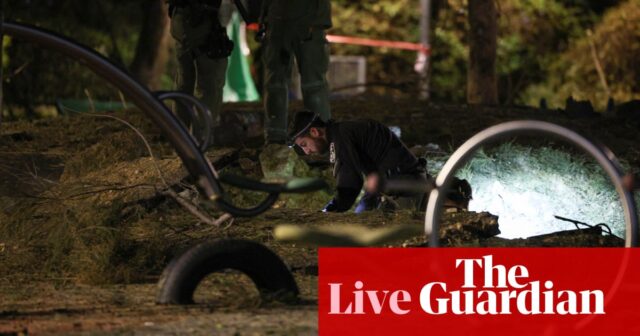Key events
The US has removed a bounty from Ahmed Al-Sharaa, the leader of the Islamist Hayat Tahrir al-Sham (HTS) group that seized power in Syria.
The move followed talks between Syria’s new authorities and a US delegation after which a HTS statement said they wanted Syria to contribute to “regional peace”.
“Based on our discussion, I told him that we were dropping the offer of a reward,” Barbara Leaf, who lead the US delegation, told reporters.
She said she told the new Syrian leader of the “critical need to ensure that terrorist groups cannot pose a threat inside Syria or outside, including to the United States and our partners in the region”.
He “committed to doing so”, she said, adding he had appeared to her as “pragmatic”.
HTS, which leads the victorious coalition of armed groups in Damascus, claims to have broken with jihadism and has sought to reassure people of its ability to revive the country after nearly 14 years of civil war.
France, Germany, Britain, and the United Nations have also sent emissaries to Damascus in recent days to establish contacts with the new authorities.
The West is wary of the risk of fragmentation of the country and the resurgence of the jihadist group Islamic State, which has never been completely eradicated there.
Israeli airstrikes killed at least 25 Palestinians in the Gaza Strip on Friday, Reuters reports, citing medics. The toll included at least eight in an apartment in the Nuseirat refugee camp and at least 10, including seven children, in the town of Jabalia.
Opening Summary
Hello, and welcome to our live coverage of developments in the Middle East.
The Israeli military said it failed to intercept a missile from Yemen early on Saturday that fell in the Tel Aviv-Jaffa area.
Paramedics were treating 14 people with minor shrapnel injuries and some were taken to hospital, the ambulance service said in a statement. The Israeli police reported receiving reports of a fallen missile in a town in the Tel Aviv area.
The Iran-backed Houthis in Yemen have repeatedly fired drones and missiles towards Israel in what they describe as acts of solidarity with Palestinians in Gaza.
On Thursday, Israel killed at least nine people when it launched strikes against ports and energy infrastructure in Houthi-held parts of Yemen and threatened more attacks against the Yemeni group.
Here’s what else you need to know:
-
The Israeli military said its forces had shot a protester during a demonstration against the army’s activities in a village in southern Syria on Friday, injuring him in the leg. Since Islamist-led rebels toppled Syrian president Bashar al-Assad on 8 December Israel has carried out hundreds of airstrikes on Syrian military facilities in what it says is a bid to prevent them from falling into hostile hands. In a move widely condemned internationally, Israel also sent troops into a United Nations-patrolled buffer zone in the Golan Heights and beyond, calling it a defensive and temporary measure.
-
Gaza’s civil defence rescue agency reported that an Israeli air strike killed 10 members of a family on Friday in the northern part of the territory, including seven children. Violence in the Gaza Strip continues to rock the coastal territory more than 14 months into the Israel-Hamas war, even as international mediators work to negotiate a ceasefire between Israel and Hamas Palestinian militants. The Israeli military told the AFP news agency it had struck “several terrorists who were operating in a military structure belonging to the Hamas terrorist organisation and posed a threat to IDF troops operating in the area”.
-
Syria wants to contribute to “regional peace”, the country’s new authorities said late on Friday, after a meeting between leader Ahmed al-Sharaa and a US diplomatic delegation. “The Syrian side indicated that the Syrian people stand at an equal distance from all countries and parties in the region and that Syria rejects any polarisation,” the statement said. It said the new authorities wanted to “affirm Syria’s role in promoting regional peace and building privileged strategic partnerships with countries in the region”.
-
The meeting between al-Sharaa – known previously by his nom de guerre Abu Mohammed al-Jolani – and the US delegation led by Barbara Leaf, head of the Middle East at the State Department, was “positive”, a Syrian official previously told AFP. Al-Sharaa, the leader of the Islamist Hayat Tahrir al-Sham (HTS) group that seized power in Damascus, was previously the target of US sanctions. But after their first formal contact in Damascus on Friday, Washington announced it had dropped a bounty for his arrest.
-
The Iranian government is attempting to salvage some influence with Syria’s new leaders, as Tehran reels from its sudden loss of authority in Damascus after the collapse of the regime of Bashar al-Assad. The Iranian president, Masoud Pezeshkian, is already facing multiple domestic and international crises, including power cuts due to a lack of oil supplies, continued tensions over its nuclear programme and a row about a new law that will toughen punishments for women who do not wear the hijab. But it is the sudden loss of influence in Syria after the fall of Assad to rebel groups that is exercising Iranian officials most.






